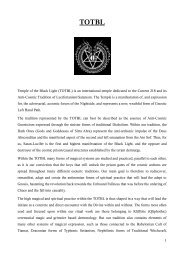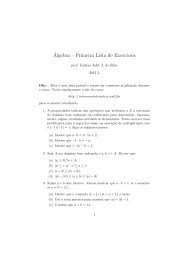Satanism Today - An Encyclopedia of Religion, Folklore and Popular ...
Satanism Today - An Encyclopedia of Religion, Folklore and Popular ...
Satanism Today - An Encyclopedia of Religion, Folklore and Popular ...
Create successful ePaper yourself
Turn your PDF publications into a flip-book with our unique Google optimized e-Paper software.
V<br />
Virgil<br />
Virgil’s Aeneid was the direct inspiration for<br />
Dante’s vision <strong>of</strong> hell in his celebrated Inferno.<br />
This indebtedness is symbolically reflected in the<br />
Inferno itself, because Virgil serves as Dante’s guide<br />
in his tour <strong>of</strong> the underworld. The Roman poet<br />
Virgil (70 B.C.–19 B.C.) was born Publius Vergilius<br />
Maro to a humble family in <strong>An</strong>des, a village near<br />
Mantua in northern Italy. He attended school at<br />
Cremona <strong>and</strong> Milan, <strong>and</strong> then he went to Rome to<br />
study medicine, mathematics, <strong>and</strong> rhetoric. Later<br />
he moved to Naples, where he studied philosophy<br />
under Siron the Epicurean. Lucretius’s philosophy<br />
<strong>of</strong> De rerum natura <strong>and</strong> Catullus’s poetry were the<br />
two major influences on Virgil during his formative<br />
years. His earliest certain work was the<br />
Bucolics or Eclogues, ten pastoral poems modeled<br />
on the Greek pastorals <strong>of</strong> Theocritus. The<br />
Georgics, his next work, is a didactic poem on<br />
farming describing the country life with which<br />
Virgil was personally familiar <strong>and</strong> dealing with all<br />
aspects <strong>of</strong> universal life, as the themes <strong>of</strong> the four<br />
books on War, Peace, Death, <strong>and</strong> Rebirth suggest.<br />
Virgil’s last years were devoted to the Aeneid,<br />
left unfinished at his death, telling about the<br />
w<strong>and</strong>erings <strong>of</strong> Aeneas after the fall <strong>of</strong> Troy, similar<br />
to the w<strong>and</strong>erings <strong>of</strong> Odysseus, <strong>and</strong> his final settlement<br />
in Latium. The poem is an epic about the<br />
formation <strong>of</strong> Roman people <strong>and</strong> the great role<br />
they played in the history <strong>of</strong> the world according<br />
271<br />
to a divine decree. The agency <strong>of</strong> fate is predominant<br />
in the poem, even though in some parts <strong>of</strong> it<br />
a spiritual dispensation is awarded to virtuous<br />
men, according to their actions.<br />
This image is particularly easy to perceive in<br />
the sixth book <strong>of</strong> the Aeneid, which can be considered<br />
the starting point <strong>of</strong> Dante’s Inferno. In this<br />
part <strong>of</strong> the poem, Virgil <strong>of</strong>fers his conception <strong>of</strong><br />
individual destiny after life, describing the descent<br />
<strong>of</strong> Aeneas into Hades, the underworld, escorted by<br />
the Sybil, to reach his father, from whom he will<br />
receive a mystic revelation <strong>and</strong> a prophecy before<br />
returning to the upper world.<br />
Virgil’s world <strong>of</strong> the dead is described as a<br />
place below the earth, which can be entered by the<br />
cave near Lake Avernus. It is thus very different<br />
from Homer’s underworld, located in the far<br />
northwest, but still apparently on the earth.<br />
Virgil’s underworld is populated by the shades <strong>of</strong><br />
great personages <strong>of</strong> legend <strong>and</strong> <strong>of</strong> the ordinary<br />
men: the righteous souls are allocated to the right<br />
region called Elysium <strong>and</strong> the sinners are<br />
punished in the left one called Tartarus, while the<br />
souls <strong>of</strong> those who have died in infancy <strong>and</strong> <strong>of</strong><br />
those who have died a violent death inhabit limbo<br />
<strong>and</strong> the region next to it.<br />
<strong>An</strong>chises, Aeneas’s father, leads his son on to a<br />
third division <strong>of</strong> the underworld, the banks <strong>of</strong><br />
Lethe, where the souls destined to return for<br />
another life to the upper world are gathered. Here
















